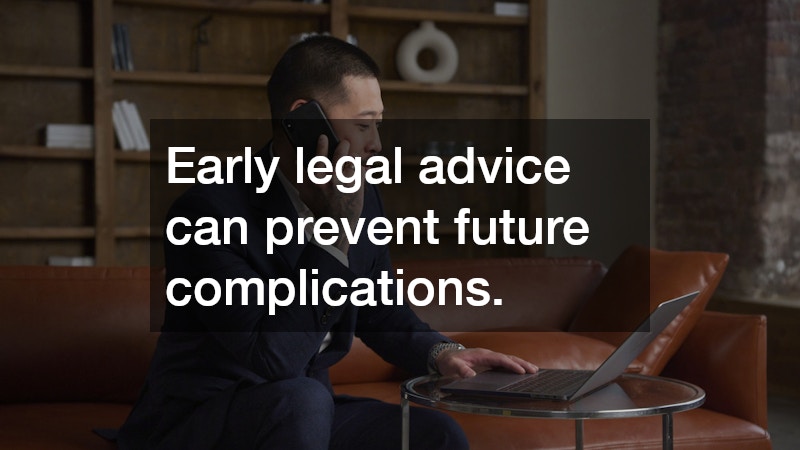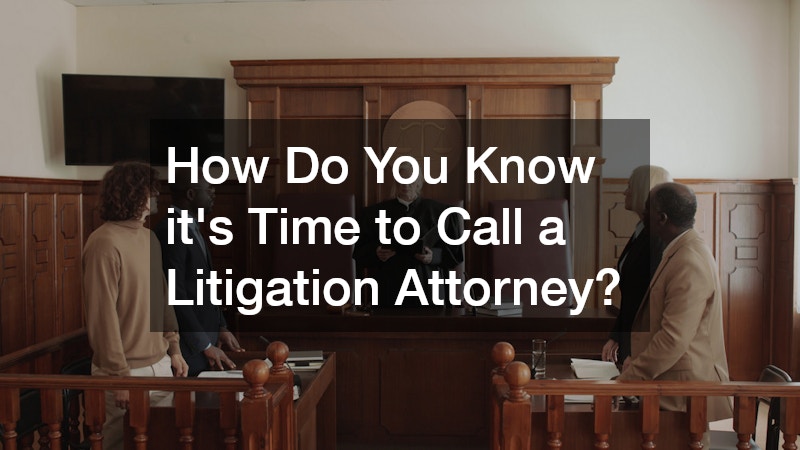How Do You Know its Time to Call a Litigation Attorney?

Navigating legal disputes can feel overwhelming, especially if you’re uncertain about whether your situation requires professional legal representation. While some disagreements can be settled through direct communication, mediation, or negotiation, other circumstances call for the expertise of a seasoned litigation attorney.
Recognizing the signs early can help you protect your rights, preserve valuable assets, and avoid costly mistakes.
Escalating Disputes That Can’t Be Resolved Informally
One of the clearest signs that it’s time to call a litigation attorney is when a conflict escalates beyond informal resolution. Whether the dispute involves a business partner, a contractor, a landlord, or a neighbor, attempts at direct communication sometimes fail.
If multiple discussions, mediation sessions, or written agreements haven’t worked, you could be facing legal action from the other party. Even if the matter doesn’t end up in court, a litigation attorney can craft strong legal strategies to negotiate favorable outcomes.
Breach of Contract or Business Disputes
Contracts are the foundation of many professional and personal agreements. A breach of contract—such as a supplier failing to deliver goods, a client refusing to pay, or a partner violating agreed-upon terms—can quickly lead to financial and reputational damage.
If you suspect or have evidence that another party has failed to uphold their contractual obligations, professional intervention is often necessary. A litigation attorney can evaluate the strength of your case, gather documentation, and advise whether litigation, arbitration, or negotiation is the best course of action.
Employment Conflicts and Wrongful Termination
Workplace disputes can create tense, complicated situations. If you’ve been wrongfully terminated, denied proper wages, or faced discrimination, you may have grounds for legal action. Similarly, employers may need to defend themselves against claims made by current or former employees.
These cases often involve intricate employment laws and regulations. Attempting to navigate them on your own can result in missed opportunities for justice or liability exposure. A litigation attorney experienced in employment law can guide you through the process, clarify your rights, and represent your interests in negotiations or in court.
Personal Injury and Liability Cases
Accidents happen, but not all are straightforward. If you’ve been injured due to someone else’s negligence—whether from a car accident, a slip and fall, or medical malpractice—you may be entitled to compensation. On the other side, if you are being accused of causing harm, you’ll need legal representation to protect your interests.
In these cases, insurance companies often get involved, which adds another layer of complexity. Insurers may attempt to minimize payouts or deny claims altogether. Having an experienced attorney ensures you’re not taken advantage of during settlement discussions and that any lawsuit filed is handled with the attention it deserves.
Property and Real Estate Conflicts
Real estate disputes often involve significant investments, making it especially important to handle them properly. Issues such as boundary disputes, landlord-tenant disagreements, or zoning conflicts can easily escalate into legal battles.
Because property laws vary widely by jurisdiction and involve highly specific regulations, navigating these issues without expert assistance is risky. A litigation attorney can analyze your case, explain the relevant laws, and pursue the legal remedies best suited to your situation.
Debt Collection and Financial Disputes
When money is on the line, disputes can become contentious quickly. Whether you’re a business owner seeking to collect from a non-paying client or an individual being pursued for repayment, legal guidance is essential.
A skilled attorney can help enforce judgments, protect your assets, or negotiate settlements. Without professional support, you risk unfavorable outcomes that could impact your financial stability for years.
When You’ve Been Served with a Lawsuit
Perhaps the most obvious sign you need to call an attorney is when you are served with a lawsuit. Being formally sued requires a timely and strategic response. Ignoring the matter or attempting to handle it alone could lead to a default judgment against you.
A litigation attorney will not only file the appropriate responses on your behalf but will also begin building a defense immediately. They can advise on settlement options, prepare for trial if necessary, and ensure deadlines and procedural requirements are met.
Preventive Legal Protection
Sometimes, the smartest time to call an attorney is before things spiral into full-blown litigation. If you suspect a dispute is brewing or you’re entering into a risky agreement, early legal advice can prevent future complications. Attorneys can review contracts, advise on liability exposure, and recommend strategies to avoid unnecessary legal battles.
Conclusion
Disputes—whether personal, professional, or financial—can quickly escalate beyond what you can manage on your own. Knowing when to seek professional help is critical. If you find yourself facing unresolved conflicts, breach of contract issues, employment disputes, personal injury claims, or lawsuits, it’s time to call a litigation attorney.
Their expertise ensures that your rights are protected, your case is thoroughly prepared, and your chances of a favorable outcome are maximized. By acting promptly, you reduce risks, safeguard your interests, and place yourself in the strongest position possible when navigating complex legal challenges.


